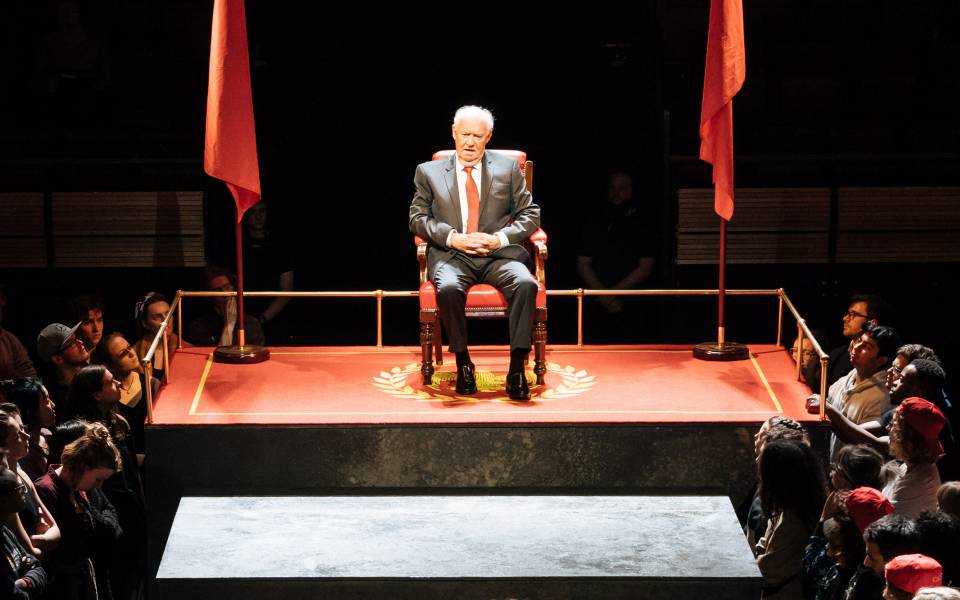
A Political Text for Our Times: Post Truth, Populism and Public Emotion in Julius Caesar
Matthew d’Ancona
“Cowards die many times before their deaths: / The valiant never taste of death but once”. On 16 December 1977, the imprisoned Nelson Mandela signed his name beside these lines from Julius Caesar in the hidden copy of Shakespeare’s works that was known as the ‘Robben Island Bible.’
That the play spoke to the Elizabethan audience of 1599 – animated by rebellion, political turbulence and the question of royal succession – is no surprise. More striking is its endurance as a text for subsequent ages, and a guidebook to power and its exercise in our own times.
To an almost uncanny extent, the great rhetorical argument over Caesar’s corpse between Brutus and Antony mirrors the fundamental divisions revealed by the extraordinary upheavals of the past two years and, more specifically, the rise of ‘Post Truth’, online populism and fake news.
As one of the Senators observes, “it is a strange-disposed time: / But men may construe things after their fashion, / Clean from the purposes of the things.” In other words, reality has become fungible, an option capriciously chosen from a buffet according to taste. Rome, like Donald Trump’s America, has succumbed to the allure of what the presidential aide Kellyanne Conway famously called “alternative facts”.
This is what eludes Brutus. In his Stoic vanity, he is the Roman counterpart of the modern liberal élite at its most insulated. He understands, as the philosopher Allan Bloom puts it in Shakespeare’s Politics (1964), that Caesar is “a man who has built his palace on the ruins of the Republic”, but, in drawing that conclusion, “thinks too well of himself”.
He urges the mob to “censure me in your wisdom” and “be the better judge”, appealing to love of country, “a place in the commonwealth” and hatred of tyranny in the abstract. He instructs them to rise above the worship of kings: “Who is here so base that would be a bondman?”
In his lofty rationalism, there are uncomfortable echoes of the Remain campaign’s bombardment of the 2016 electorate with statistics during the EU referendum, embedded in which was the message that only a fool, an undeveloped citizen, could vote for Brexit.
In his moral certainty – “armed so strong in honesty” as he puts it in his argument with Cassius – Brutus is always quick to dismiss man’s lower instincts and to scorn ‘bondmen’, ‘slaves’ and ‘undeservers’. He would have nodded as Hillary Clinton vilified half of Trump’s supporters as a “basket of deplorables”.
No less than Brutus, Clinton personified the belief that a republic is best led by those who have proved their civic virtue, boast the strongest credentials, and have clambered the cursus honorum – the ladder of public office. What her Republican opponent grasped was that the rules of the game had changed. In the age of shattered public trust and rhetoric weaponised by social media – “the universal shout” as the tribune Marullus would have called it – politics could become a branch of show business. Trump, a reality TV star rather than a public servant, treated the US voters as an audience consuming entertainment rather than a civically engaged electorate – and was duly rewarded.

Antony senses the same potential in the febrile mood of the Roman mob. His oratory is a chilling masterpiece of Post Truth politics, reflecting a cunning recognition that, in febrile times, emotional resonance matters much more than rational evaluation.
In addition to his ironic destruction of Brutus, he employs narrative rather than logic, blaming each of the conspirators for a specific wound with all the vigour of a story-teller rather than the forensic detachment of a prosecutor (“Look, in this place ran Cassius’ dagger through”). Whether or not these details are correct, they have emotional impact, which is all that Antony seeks. As Trump once said, when asked if it was really true, as he claimed, that the tiles in the nursery at Mar-a-Lago, his West Palm Beach club, were personally made by Walt Disney: “Who cares?”
No less than today’s most ruthless manipulators of social media feeds, secret algorithms and big data, Antony knows exactly what he is doing. “Mischief, thou art afoot, / Take thou what course thou wilt.” As Garry Wills remarks in his study of the play’s rhetoric, he grasps “the difference between leadership that issues orders and leadership that recruits cooperation”.
It is precisely for this reason that Antony brandishes a document that he says is Caesar’s will and buys the support of the crowd with a legacy of “seventy-five drachmas” a head, as well as access to the fallen leader’s walks, orchards and private arbours.
This is populism at its purest, a promised bonanza with which Brutus’s high morality can scarcely compete. The heirs of Antony feel no more compunction promising £350m week extra for the NHS or a “big beautiful wall” along the US-Mexico border. What matters to them is not honesty or practicality but the immediate visceral response that their narrative provokes.
In today’s politics, as in Julius Caesar, menace walks hand-in-hand with bogus charm.
Even as he flatters the mob, Antony raises the prospect of “a sudden flood of mutiny”, calling upon the very “stones of Rome” to rise in fury. Laced as his speech is with professions of love and comity, it is a call to civil disobedience – as intellectually dishonest as Trump’s studied evenhandedness between white supremacists and neo-Nazi supremacists after the Charlottesville riots, or his invocation in his inaugural speech of “American carnage”. The populists of the 21st Century play with the same fire that ignites Shakespeare’s Renaissance Rome.
The failure of Brutus is the failure of so many élites to recognise the power of instinct and impulse, and the need to communicate their values in a way that recognises emotional as well as rational imperatives.

To encounter Julius Caesar afresh in our own time is to recall that moral and political rectitude is not enough. More than ever, truth needs an emotional delivery system that engages with experience, memory and hope. The pendulum will not swing back from the Corbynite and Brexiteer fringes to a comforting metropolitan centre-ground.
Yet the play is much more than an indictment of oligarchical presumption. It is about us, as well. The clearest-eyed of the conspirators is Cassius who sees not only that Brutus is wrong to let Antony live but that the people themselves are wholly complicit in Caesar’s autocracy: “I know he would not be a wolf, / But that he sees the Romans are but sheep.”
Shakespeare’s plebeians are ovine indeed. They fall first for Brutus, yet miss his entire purpose when they cry “Let him be Caesar” – offering precisely the tyrannical power from which he sought to protect the republic. No less quickly are they swayed by Antony’s charisma to turn on the conspirators.
Such pliability is easy to disparage as pre-democratic primitivism – until one recalls the faddish speed with which “Oh, Jeremy Corbyn!” became the chant of the summer, or the spectacle of thousands of ordinary Americans shouting “Lock her up!” when Trump mentioned Clinton at his rallies.
Our immunity to the contagions of the herd is not as strong as we might suppose, or care to be reminded. If the remarkable events of the past two years have a lesson, it is that modern democracy is not as robust as it once seemed. Less than one in three of American millennials – those born since 1980 – believe that it is absolutely ‘essential’ for them ‘to live in a democracy’.
Only 19 per cent of the same age-cohort insist that it would be illegitimate for the military to seize power if the civilian government proved incompetent. As the Harvard philosopher Yascha Mounk has written: “we must at this point ponder the possibility that the self-correcting mechanisms on which we pin our hopes for the future will turn out to be just as illusory as those that have proved elusive in the past.”
It falls to a lone plebeian to issue one of the core warnings of the play: “I fear there will be a worse come in his place”. What matters more than Caesar’s fall is what follows him. “O Julius Caesar, thou art mighty yet!” cries Brutus, as Rome descends into violence and he grasps the vicious irony that the conspirators, by killing Caesar, have made him a god and ensured the ultimate victory of Caesarism.
The same dilemma is posed by contemporary politics: what happens when the Brexiteers have done their work? Who will succeed Trump?
Such questions nag at the conscience like ragged nails. It is tyranny, not just tyrants, that we must fear. It is our own weakness that allows charismatic leadership to become autocracy. Julius Caesar remains so unsettlingly contemporary because its ultimate challenge is not to those who seek power, but to the rest of us. The fault is not in our stars, but in ourselves.
Matthew d’Ancona, January 2018
Matthew d’Ancona is author of Post Truth: The New War on Truth and How to Fight Back, a columnist for The Guardian and the Evening Standard, and a regular contributor to BBC Radio 4’s Today programme. He is also a former Editor of The Spectator and was elected a Fellow of All Souls College, Oxford, in 1989.
This article was originally published in the production’s programme.
Photos by Manuel Harlan.
Further reading

Sounding Names
Peter Holland
In the summer of 2017 a number of Republicans in the US were incensed to learn that the New York Public Theatre’s production of Julius Caesar had Caesar made to look somewhat like (orange hair, red tie) and gesturing even more like Donald Trump…
More →
The Assassination that Set the Template
Mary Beard
The murder of Julius Caesar on 15 March 44 BCE – the ‘Ides of March’ in the Roman calendar – is the world’s most famous assassination. It set the pattern for the future. For many of the Roman emperors who followed Caesar likewise came to violent ends…
More →